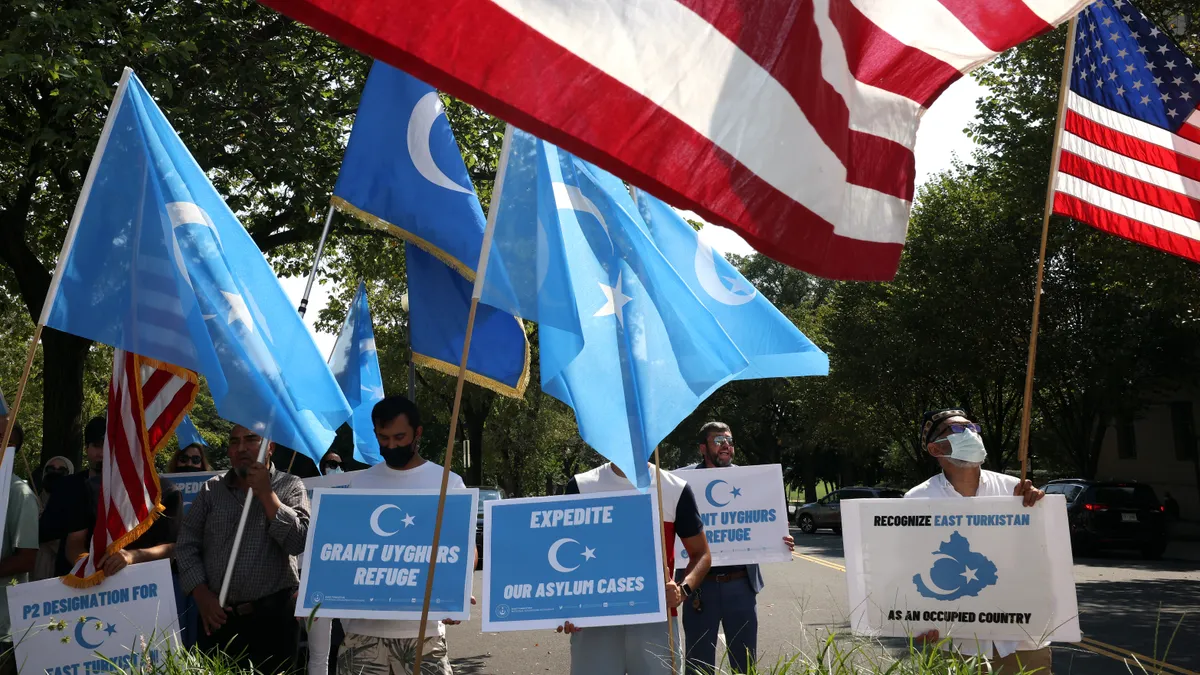Dive Brief:
- One year after the enforcement of the Uyghur Forced Labor Prevention Act, some $1.7 billion worth of shipments bound for the U.S. have been detained, according to a Kharon report released this month.
- The UFLPA was passed in 2021 and addresses concerns of forced labor in the Xinjiang Uyghur Autonomous Region. It bans the shipment of products from the area to the United States, and enforcement of the law began in June 2022.
- The UFLPA has required fashion and apparel companies to ensure their products don’t contain materials that were made with forced labor. Earlier this year, U.S. lawmakers asked Shein, Temu, Nike and Adidas to detail their compliance with this law, among other requests.
Dive Insight:
As of July 2023, the U.S. Customs and Border Protection detained 5,059 shipments from more than five countries, according to the report. The majority of these were imported from Malaysia, Vietnam and China. More than 36% of the shipments were directly from China.
Of these shipments, apparel, footwear and textiles as well as industrial, manufacturing and electronics have been the primary target of detentions, per the report.
Between June and December 2022, 2,470 shipments were detained. Of those, 1,127 shipments were denied and 1,082 were later released. So far in 2023, 606 shipments were denied and 988 were released.
There is no de minimis threshold for the UFLPA, the report states. The de minimis provision refers to the section of the Tariff Act of 1930, which mostly exempts packages worth less than $800 from being reviewed. Some fast fashion companies are exempt from extensive customs scrutiny, and lawmakers have proposed legislation to close this loophole, citing forced labor concerns, among others.
Under the UFLPA, products that contain “even a trace amount of inputs made with forced labor [are] subject to a possible enforcement action,” according to the Kharon report.
“The sheer volume and scope of goods targeted under the UFLPA poses significant challenges for industry, as supply chains have increasingly become globalized, complex and opaque,” Kit Conklin, vice president of Kharon, said before a Congressional-Executive Commission on China in April, as quoted in the report.
“The critical challenge for industry — to discover supply chain visibility and detect risk — is compounded by the Act’s rebuttable presumption and the lack of a de minimis exception, meaning even an insignificant input of product produced in-whole or in-part with forced labor could result in enforcement acton.”
China has been accused of detaining more than 1 million Uyghur people in the region and subjecting them to forced labor following detention in re-education camps, according to the U.S. Department of Labor website. In addition, the U.S. Department of Labor has said workers in the region may also experience "coercion without detention."
The U.S. isn’t alone in introducing legislation to ban products from the area. Germany, the EU and Canada have also introduced similar legislation, per the report.
The Kharon report authors suggest that as the UFLPA enters its second year, company leaders should adopt a “proactive, risk-based approach” to compliance by adopting due diligence tools to ensure their supply chains don’t contain materials made with forced labor.











